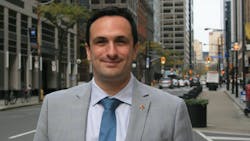- One word to describe yourself: Motivated
- Alma Mater: Carleton University in Ottawa
- Favorite station or stop that you have ever visited or frequent (and why): Papineau in Montreal. it is a pretty cool station in terms of art. That goes back to when stations were first built, and Montreal really took the lead in placing public art at the center of the Metro station experience in Canada.
- Favorite route you have ever ridden or frequent (and why): In Toronto, the 505 Dundas streetcar. It is the one I use the most and it has features new streetcars, but it is also one of most diverse routes in our country. It connects different sorts of neighborhoods, but there is the common bond of mobility and the need to get somewhere.
Marco D’Angelo started his transit career with the Canadian Urban Transit Association (CUTA) in 2003 as director of public affairs and communications before moving to the Ontario Traffic Council and pursuing an MBA from the University of Montréal’s HEC. He returned to CUTA in 2018 to serve as president and CEO.
In his first year as CEO, D’Angelo led CUTA and its members in important advocacy work in Ottawa. Elections at the federal and provincial levels provided opportunities for CUTA to engage with political parties and the electorate to promote public transit and how its economic, environmental and social benefits contribute to community building in Canada. CUTA’s Priority Transit campaign sparked an expansive dialogue on social media and culminated in two well-attended policy forums held in Vancouver and Montreal.
D'Angelo transformed CUTA’s learning and networking events in 2019, directing two successful conferences focused on technology in transit and generating innovation. The association hosted the Young Leaders Seminar for the first time since 2013, bringing together delegates from across the country with fresh perspectives on creating sustainable communities.
This year has brought mounting challenges for Canadian transit systems because of the COVID-19 pandemic. D’Angelo mobilized the CUTA team, immediately consulted with transit systems across the country, spearheaded the development of a COVID-19 resource page, led calls with operators in urban rail, bus and specialized transit to share best practices and provided the opportunity for operators to discuss solutions among themselves. He also worked with multiple stakeholders on behalf of the Canadian transit industry to develop an “ask” of the federal government for transit to be included in relief funding.
As his nomination form stated, “He has inspired CUTA’s team to pull together in this time of crisis and he will continue to work hard on behalf of the Canadian transit industry to advance the evolution of integrated urban mobility.”
Is there a specific experience that led you to where you are today?
It goes back to 2003, working with transit at that time to get on the federal government's radar and begin the first programs that support capital for urban rail and mass transit across Canada, and then my experience in road user safety and promoting sustainable modes of transportation. It's work I've done pretty much continuously for 15 years. I became CEO of CUTA two years ago and I really brought those experiences to help me to guide and support the needs of the transit industry in Canada.
What do you enjoy most about your job?
Every day is different - even before COVID. The job requires a lot of creativity, energy and leadership and every day, there are new challenges and opportunities for our industry and for our members. In terms of technology, we're at an exciting point.
These are the types of varying work that any young professional would find very engaging when choosing a career path like transit.
What’s the most challenging part of your job?
A very big challenge for Canadian transit systems was the moving of one million essential workers during the height of the pandemic. Not every system was able to collect fares but understanding the critical and irreplaceable role of public transit in our communities to get essential workers to and from their jobs, transit came through and provided that service. It has certainly been a challenging period and there will be additional challenges ahead with rebuilding, improving customer confidence and meeting and exceeding health standards. We know what the next challenges will be and that's what makes these jobs so engaging.
Accomplishment you’re most proud of and why?
I’m proud of a couple things: One is having hosted the first Young Leaders Seminar on sustainable transportation, going back to 2004, I was very happy to resume that last year in Calgary. I think the summit is a super way for young people to have exposure and facetime while mapping out their career. We’re also leading the charge during COVID-19 on advocating for Canadian transit systems, that's been certainly a good source of pride as well.
Best advice/tip/best practice to share from your area of expertise?
Transit is a career path where you can be front and center in terms of greening transportation and building your community, unlocking economic opportunities in your neighborhood or city and advancing equity, whether that's social or in terms of getting around in a way that is accessible for households of all different income. Transit is an interesting multifaceted business for young professionals.
Why do you like being a part of the public transit industry?
You can build a great network of very committed people. Transit's a long-term industry where people come and stay because they see the intrinsic value of what is provided.
There are a lot of different reasons to get involved in transit, because the industry runs the gamut from marketing and sales to fleet and engineering. And then there are some of the big projects that are planned for Canada cities in terms of preparing them to grow and to expand their transit networks. There are so many things going on that there is never a bad entry point for young professionals to choose a career in transit.




